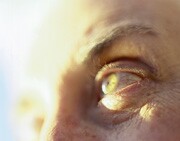- Could Your Grocery Store Meat Be Causing Recurring UTIs?
- Are You Making This Expensive Thermostat Error This Winter?
- Recognizing the Signs of Hypothyroidism
- 10 Strategies to Overcome Insomnia
- Could Artificial Sweeteners Be Aging the Brain Faster?
- Techniques for Soothing Your Nervous System
- Does the Water in Your House Smell Funny? Here’s Why
- Can a Daily Dose of Apple Cider Vinegar Actually Aid Weight Loss?
- 6 Health Beverages That Can Actually Spike Your Blood Sugar
- Treatment Options for Social Anxiety Disorder
Scientists Use Stem Cells to Grow Human Corneas in Mice


A new method of enhancing the re-growth of corneal tissue to restore vision offers possible promise to people whose corneas have been damaged by disease, burns or chemicals, researchers report.
The scientists focused on limbal stem cells, which help maintain and regenerate corneal tissue. The loss of limbal stem cells due to disease or injury is one of the leading causes of blindness.
Tissue or cell transplants have been used to help the cornea regenerate. But the results weren’t consistent because it wasn’t known if any or how many limbal stem cells were in the transplanted tissue or cells, the study authors noted.
For this study, the investigators used a molecule called ABCB5, which is a “marker” — or sign — for the hard-to-detect limbal stem cells. Using this method, they zeroed in on limbal stem cells from human donors and used the stem cells to re-grow anatomically correct and fully functional human corneas in mice.
The research is published in the July 2 issue of the journal Nature.
“Limbal stem cells are very rare, and successful transplants are dependent on these rare cells,” study co-author Bruce Ksander, of the Massachusetts Eye and Ear/Schepens Eye Research Institute, said in an institute news release.
More information
The U.S. National Library of Medicine has more about corneal disorders.
Source: HealthDay
Copyright © 2026 HealthDay. All rights reserved.










